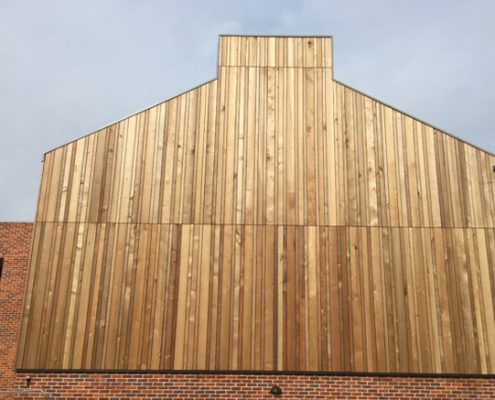Canadian is a Durable softwood, UK Grown is only a Moderately Durable softwood. This specie can be used for many purposes where attractive appearance or resistance to weather is important. This timber is slow grown, naturally durable, stable, light weight and has a natural beauty and warmth complemented by a uniform fine grain which makes it easy to work with and finish.
It is a soft timber and can be nailed or screwed. However, as it is a soft timber it may be more prone to physical damage such as splitting and indentation/bruising, so care should be taken. The strength properties of cedar are significantly lower than that European Redwood (Pinus Silvestris) by 20% in bending and 15% in stiffness.
It has excellent thermal properties which are important in today’s modern building environment where thermal efficiencies and saving are critical factors. Cedar will colour down to a silver/grey colour if it is not protected as soon as installation is complete with a good quality semi or fully translucent UV-radiation protective coating. The specie is durable and does not need additional treatment for external use; however the sapwood must be excluded.
Most Western Red Cedar in the used in the U.K. is imported from North America and Western Canada. However, home-grown Western red cedar has been growing in our country for 90 years plus. This specie does grow faster and is softer and is classed as moderately durable. Homegrown Cedar is significantly cheaper over North American and Western Canadian alternative and from a carbon foot print perspective, is worth considering as the product does not have to travel half way round the world to our country.
More Information
The soft red-brown timber has a tight, straight grain and few knots.
It is valued for its distinct appearance, aroma, and its high natural resistance to decay, and is used in many external joinery applications for decking, posts, post and beam, shingles and a range of cladding products..
It is also in a number of internal joinery applications to line furniture cabinets, wardrobes and storage chests.
It has strong smelling aromatic oils which are believed to discourage moth and carpet beetle larvae, which can damage cloth by eating wool and similar fibres.
A well sealed furniture cabinet, warbrobe or storage chest for example will retain its aromatic aroma for many decades and centuries.
Its light weight, strength and dark warmth also make it great choice for guitar sound boards.
Wood Type: Softwood
Origin: North America and Western Canada
Sustainability: All from well managed forests – We stock only PEFC and or CSC certified.
Availability: Sawn and planed products in a wide range of thicknesses, widths and profiled patterns
Colour: Salmon Pink Sapwood to Dark Brown Heartwood – If left unprotected, it will turn to a silver grey colour.
Quality: Imported as No.2 Clear and Better and No 4 Clear and Better and we do our own bespoke specialist quality grading and selection
Typical end uses: Claddings, Brise Soleil systems, Decking, Shingles, Furniture
Durability: Durable, High resistance to decay
Density: 390 kg per m3 at 12% moisture content
Dimensional stability: Small. It has a very low shrinkage factor and is superior to all other coniferous woods in its resistance to warping, twisting and checking
Fixings: This specie contains natural oils which can have a very corrosive effect on steel fixings. We would recommend only top quality stainless steel fixings are used.
Nails and screws used to fasten Western Red Cedar should be about one-third longer than those used to fasten hardwood species.
We would recommend only top quality stainless steel fixings are used to avoid corrosion of fixings and blue staining of the profile.
Annular Ring shank nails are preferable to normal wire nails as ring shank nails offer extra grip.
We would suggest the length of the nail should be two and a half times the thickness of the board. The nail should penetrate the batten by at least 32mm.
Strength & Working Properties: The strength properties of cedar are significantly lower than European Redwood (Pinus Silvestris) by 20% in bending and 15% in stiffness. As it is a soft timber it can be more prone to physical damage in terms of splitting and indentation/bruising, so care should be taken.
Sizes and lengths available: 25, 32, 38, 50, 100, 125, 150 Thickness //100 mm and wider. 1.828 – 4.88 metres and longer
Chemical Properties: This specie has natural preservatives which can have a corrosive effect on some unprotected metals, causing a black stain on the wood. Fine dust may be an irritant.
Get a Quote
Contact us for more information, a sample or a prompt quotation.





